1916 - just what are we celebrating?
 national |
history and heritage |
feature
national |
history and heritage |
feature
 Thursday April 13, 2006 18:35
Thursday April 13, 2006 18:35 by Andrew Flood - WSM 1916 Working Group
by Andrew Flood - WSM 1916 Working Group wsm_ireland at yahoo dot com
wsm_ireland at yahoo dot com

Freedom, left republicanism and anarchism.
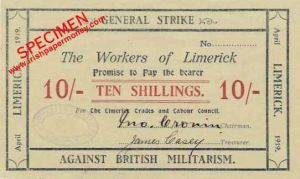
Money issued by 1919 Limerick soviet
An anarchist analysis of the 1916 insurrection and the war of independence / tan war in the context of the struggle for socialism in Ireland and internationally. Concentrates on the 'unknown' intense class struggle that ran alongside the war of independence and the role republicanism played in the suppression of that struggle in the interests of nationalist unity. Asks what is freedom and shows how anarchism originated amongst earlier European left republicans as an answer to the limitations of republicanism.
An alternative analysis of the legacy of 1916: Previous Indymedia feature
1916 - just what are we celebrating?
There is something very odd with the official commemoration of 1916. The same government which is celebrating an insurrection against imperialism 90 years ago is today - against the wishes of the majority of the Irish people - allowing Irish airports to be used in support of an imperialist war. And whereas the 1916 proclamation referred to "the right of the people of Ireland to the ownership of Ireland" successive southern governments have shown themselves to be on the side of international corporations. Currently this has manifested itself in the manner in which the Corrib gas fields off Co. Mayo have been handed over to the Shell corporation.
The program of the insurrection
The reason they can get away with this hypocrisy is because the 1916 proclamation is long on rhetoric about "dead generations" and "august destiny" but short on any sort of concrete program, never mind one that addressed the needs of the working class. The 1916 proclamation says very little about the sort of Ireland the rebels wanted to see. This has allowed every party in the south to claim to stand in its tradition in the 90 years since it was first read out.
The rising was heroic and it did shape the face of modern Ireland, but is there much in the rising for anyone on the left to celebrate? This blow against imperialism after all is somewhat undermined by the description of German imperialism in the second paragraph of the proclamation as "gallant allies in Europe". And the promise that "The Republic guarantees .. equal rights and equal opportunities to all its citizens" holds no threat to European capitalism of today which also claims to stand for such things.
Despite the fact that the Ireland of the time was deeply divided, right down to the formation of two rival and armed militas the proclamation simply "claims the allegiance of every Irishman and Irishwoman" despite "the differences" .. "which have divided a minority from the majority". The bitter sectarian divisions that already existed in the Belfast working class were unlikely to be overcome in such a manner!
The left and 1916
Connolly has been quoted as saying at an Irish Citizens Army rally a week before the rising that ".. if we should win hold on to your rifles because the Volunteers may have a different goal. Remember we're out not only for political liberty but for economic liberty as well" so certainly the left at the time was aware of the missing equality from the proclamation. As usual in reaching a compromise between socialism and republicanism the socialist element had to be pushed to one side.
Despite this sections of the Dublin left made a real contribution to the rising. Not only was James Connolly a socialist but around 20% of the combatants were from the Irish Citizen Army whose origins lay in a revolutionary syndicalist union, the ITGWU. Other participants in the rising recorded that for at least some of them "this military revolution was to be followed by the industrial revolution".[1] But that left was destroyed by the rising and although the ICA was to be reborn in name, in reality, as Frank Robbins imprisoned for 2 years after 1916, said "the majority of the new members, strange as it might seem, did not hold or advocate the social and political views that had motivated those who fought in 1916" (2)
The state which arose was hostile to the interests of Irish workers and even during the War of Independence the IRA was to act against the struggles of those workers again and again. As Ernie O'Malley (OC 2nd Southern Division, IRA) summarised "There was land trouble in the South and West. The Dail, afraid of the spread of land hunger, used the IRA to protect land owners; the IRA who were in sympathy with those who wanted to break up estates carried out the orders of the Minister of Defence." (3)
Class struggle during the War of Independence
The events of 1916 are quite well known - what most people, even those on the left, are unaware of is that intense class struggle was waged in the years between 1918 and 1923. There were 5 general strikes in southern and western Ireland between August 1918 and August 1923 and 18 general local strikes, twelve of these in 1919. In the course of these workers took over the running of towns and cities across Ireland, most famously with the 1919 Limerick Soviet but this happened even in the small town of Dungarvan. In 1918 for one month in Dungarvan;
"Nothing could be bought or sold without a union permit. Nothing could enter the town without union permission. People who tried to break the blockade had their carts overturned and their goods destroyed .. The strike committee set up its own rationing and distribution system" [4]
Landless labourers across Ireland took part in land occupations and in cattle drives. Workers occupied their workplaces and sought to keep production going.
Pitched battles were fought between workers and police, republican police and even self styled 'white guards' set up by employers. Of the General Strike of April 1920 the Manchester Guardian noted "the direction of affairs passed during the strike to these [workers'] councils, which were formed not on a local but on a class basis. In most places the police abdicated, and the maintenance of order was taken over by the local Workers Council .. In fact, it is no exaggeration to trace a flavour of proletarian dictatorship about some aspects of the strike".
Yes as historian Emmet O'Connor notes "Despite the proved value of the strike .. Dail Eireann never sought to invoke it, or attempt to manipulate political strikes once they had begun. Employing a weapon of social conflict would have run counter to Sinn Fein's integrationist strategy"5]
This was a time of militant syndicalist struggle across the European working class. In Ireland some of these workers would have been IRA members but the methods of struggle they used were not those of the Irish republicanism but of Italian anarchists, French syndicalists, British trade unionists and even Belfast shipyard workers. The sole contribution of the War of Independence, and in particular the IRA's targeting of the forces of 'law and order', was the creation of a vacuum in which these workers' struggles could progress much further than might have been otherwise possible.
The price of success
This lack of 'law and order' meant that for the British and Irish capitalist class Sinn Fein came to be seen as a way of returning to business as normal. The forces of the crown could no longer guarantee the law and order needed to keep business as usual, perhaps the IRA could play that role. Sinn Fein started to prove that it could be trusted to manage capitalism in southern Ireland on May 17 1920 in Ballinrobe, Co Mayo. That day the first public Arbitration Court was held by Sinn Fein. This found against small holders who had occupied a 100 acre farm. Although the small holders defied the court decision and remained in occupation, in the words of a Dail pamphlet "the Captain of the local company of the IRA descended upon them with a squad of his men- sons of very poor farmers like themselves - arrested four of them, and brought them off to that very effective Republican prison - an unknown destination" (6)
Peadar O'Donnell who was OC of 2nd brigade IRA (Derry and East Donegal) writing in 1963 observed "Many an IRA man in jail in '22 and '23 cursed his use as a defender of pure ideals to patrol estate walls, enforce decrees for rent, arrest and even order out of the country leaders of local land agitation" (7) In other words the IRA could protect the rich in a way that the RIC were no longer capable of.
This was Irish republicanism at its most militant period, it was simultaneously a period when Irish workers were at their most militant. Yet the direct actions of these workers were seen as a hindrance to the republican struggle - something that threatened unity. Breaking these workers' struggles was the way that the Dail won the allegiance of a large section of Irish capitalism. It demonstrated that unlike the British state it could maintain law and order and protect the property and land of the wealthy from the working class.
It's worth noting that these accounts from senior IRA officers emphasise either that the rank and file IRA men involved in suppressing the land occupations were themselves poor labourers or that they were unhappy with the role they were ordered to play. Ernie O'Malley further observed that "The farm labouer could understand the city workman, and was organised in labour unions with him. The movement as a whole was hostile to labour claims even though labour had helped to prevent conscription, had not contested the last election, and was now refusing to carry armed troops" (8)
The limits of left republicanism
So while left republicanism may look like an attractive short cut to socialism it is one based on building on sand. The weakness of republicanism is not in its failures but in its successes because success requires building nationalist unity, whether that be military as during the War of Independence or political as in the Peace Process. The price of such unity is constant - the marginalisation and removal from the agenda of any prospect of social revolution.
Anarchism arose out of an understanding of the limits of socialist republicanism. Because of this it didn't reject the core concepts of the republic, it built on them. What do we mean by this?
What is Freedom?
Everyone, from George Bush and Michael McDowell talks of being for freedom but what does freedom mean? We have already seen how the 1916 proclamation talked only of "equal rights and equal opportunities" but left aside any mention of economic equality even though at least one of the signatories, James Connolly, knew this was a requirement for any real freedom.
Liberty, Fraternity, Equality was the slogan that encapsulated the French revolution and captures the debate that was to follow, a debate out of which anarchism eventually emerged. The words sound fine but what do they mean? Does equality simply mean equality before the law, something that now exists in theory in the western world. Or does it mean equal access to all that is produced. In that debate is the gulf between Bush's Republican party and anarchist communism.
In the context of Ireland republicanism really starts just before the 1798 Rebellion. Rebellions before this date were about a return to more traditional rulers or whether we would be ruled by a protestant King of England or a catholic King of England. Whatever the mythologies built up by loyalism on the one hand and Irish nationalism on the other freedom, for the mass of the people, was never really on the agenda.
The 1798 rebellion however aimed at bringing in a new and democratic form of society. Contained within some of the various rebel factions was a 'levelling' agenda that talked in the language of the times of economic liberty. The Poor Man's Catechism, published anonymously in the 1790's included
"I believe in a revolution founded on the rights of man, in the natural and imprescriptable right of all citizens to all the land ... As the land and its produce was intended for the use of man 'tis unfair for fifty or a hundred men to possess what is for the subsistence of near five millions ...".
National unity V the 'men of no property'
In the South today we live in a 'republic' but it is one where not much more than fifty or a hundred men possess what "is for the subsistence of near five millions". In our republic 10 families owned almost all of the land suitable for housing around Dublin and because of this in the last decade they have become multi millionaires.
Right from the origins of republicanism across the globe it represented an alliance which included those who wanted to go a lot further than political liberty and recognised that equality also required fundamental changes in property laws etc. The men of no property are not just key figures in 1798, they appear in every republican insurrection on the globe.
The story of anarchism starts with the republican revolts that broke out all across Europe in the year 1848. These revolts saw the emergence of very distinct working class movements that sought to introduce socialism as part of fight for the republic - the development of what today and in the Irish context we might call socialist republicanism.
The origins of anarchism in left republicanism
One republican active in those years was the Russian left republican Michael Bakunin who was later to become an anarchist. At this time the Slavic people were under the yokes of no less than four Empires, those of the Russian Czar, Austria-Hungary, the Ottomans (modern day Turkey) and the Prussians.
The republican revolts of 1848 saw Bakunin participate in the Slav congress in Prague and publish 'An appeal to the Slavs'. This appeal has many things in common with later socialist republican statements, for instance the call for revolutionary Slavic unity against the German, Turkish and Magyars occupations "while we stretched our fraternal hands out to the German people, to democratic Germany". As Connolly was to do later he sought to present socialism as an inevitable part of winning the republic. Bakunin at this time, like Connolly before 1916, expected the best republicans to become socialists once they realised this - Bakunin going so far as to claim that; "Everybody has come to the realisation that liberty was merely a lie where the great majority of the population is reduced to a miserable existence, where, deprived of education, of liberty and of bread, it is fated to serve as an underprop for the powerful and the rich." The Appeal to the Slavs ends with "The social question thus appears to be first and foremost the question of the complete overturn of society."(9)
Bakunin began to reject left republicanism after the 1863 Polish insurrection when he saw that the Polish nationalists were more interested in Ukrainian land than the support of the Ukrainian Slavs and that they were more afraid of Polish peasant insurrectionists than the Czar. In other words if they could not keep the working class in check the Polish capitalists were willing to sacrifice the republic.
The anarchists break with left republicanism
Bakunin went to Italy where he worked on an international project of revolutionary organisation with republican exiles from many countries. They sought a way to develop republican organisational structures and a set of principles that would see the abolition of class society rather than just swapping a foreign boss for a domestic boss.
The sort of new society they advocated was a radical advance in Europe of the 1860's and remains both relevant and radical today. They argued that
"the advent of liberty is incompatible with the existence of States."
"the free human society may arise at last, no longer organised ... from the top down... but rather starting from the free individual and the free association and autonomous commune, from the bottom up"
"labour being the sole producer of social assets, anyone enjoying these without working is an exploiter of another man's labours, a thief, and work being an essential underpinning of human dignity, the only means by which man actually conquers and creates his freedom, all political and social rights must henceforth be extended to workers alone."
Thus Anarchism emerged in an organised form as a result of a group of experienced left republican revolutionaries drawing the conclusion that the achievement of real freedom meant breaking with nationalist class alliances and looking instead to international working class rebellion. But they carried some of their republican tradition with them, not least the emphasis on individual freedom. Perhaps the best one sentence summary of anarchism expresses this, again from Bakunin that
"Liberty without socialism is inequality and injustice"
but this is not simply a critique of republicanism, it is part of a couplet, the other half of which is a republican criticism of the tendency of socialists to see individual freedom as an irrelevancy, that is
"Socialism without Liberty is brutality and slavery".
The lessons of 1916
If the goal of the 1916 insurrection was freedom for the people of Ireland then it failed, and not just because of the treaty and partition. Because the left sacrificed all mentions of economic equality the state that arose in the south could and does base itself on the proclamation. Ironically writing some 17 years before 1916 Connolly himself had highlighted what this would mean when he wrote "After Ireland is free, says the patriot who won't touch socialism, we will protect all classes, and if you won't pay your rent you will be evicted same as now. But the evicting party, under command of the sheriff, will wear green uniforms and the Harp without the Crown, and the warrant turning you out on the roadside will be stamped with the arms of the Irish Republic. Now, isn't that worth fighting for?"
In 1916 admist the imperialist slaughter of the First World War Connolly decided that this limited program was worth fighting for. 90 years on we can admire those involved in the insurrection but at the same time the insurrection is a demonstration that even the most left of republicans, as Connolly then was, find themselves forced to drop the working class elements of their program in the interests of nationalist unity. Anarchism argued left republicanism was a dead end in the fight for freedom in 1866, Connolly's sacrifice in 1916 only served to confirm this.
---
This text is an extended version of the contribution I gave to the Anarchism and Republicanism debate with Tommy McKearney at the Anarchist bookfair.
List of Events commemorating the Easter Rising
(As compiled by Indymedia Ireland Editors)
Fri 14th April 2006:
Sat 15th April 2006:
Sun 16th April 2006:
Tues 18th April 2006:
Thurs 20th April 2006 (Cork):
Sun 23rd April (Co. Kerry):
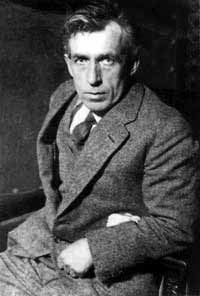
Peadar O'Donnel photographed in 1930
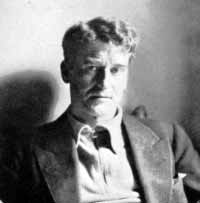
Ernie O'Malley - Assistant Chief of Staff of the IRA during tan war
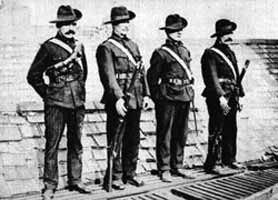
Citizen Army on the roof of Liberty Hall
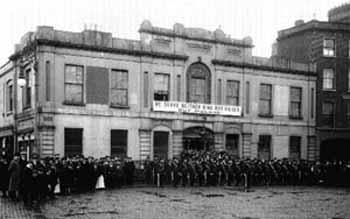
Citizen Army assembled outside Liberty Hall
 national |
history and heritage |
feature
national |
history and heritage |
feature
 Thursday April 13, 2006 18:35
Thursday April 13, 2006 18:35 by Andrew Flood - WSM 1916 Working Group
by Andrew Flood - WSM 1916 Working Group wsm_ireland at yahoo dot com
wsm_ireland at yahoo dot com





























 printable version
printable version

 Digg this
Digg this del.icio.us
del.icio.us Furl
Furl Reddit
Reddit Technorati
Technorati Facebook
Facebook Gab
Gab Twitter
Twitter
View Full Comment Text
save preference
Comments (49 of 49)